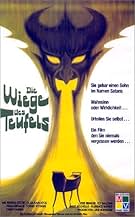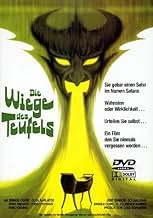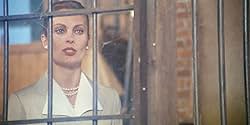A blind boy, who lives alone with his mean sister in a rundown hotel in Venice, receives a vision that warns him of the upcoming birth of the Antichrist. Soon, his sister mysteriously become... Read allA blind boy, who lives alone with his mean sister in a rundown hotel in Venice, receives a vision that warns him of the upcoming birth of the Antichrist. Soon, his sister mysteriously becomes pregnant.A blind boy, who lives alone with his mean sister in a rundown hotel in Venice, receives a vision that warns him of the upcoming birth of the Antichrist. Soon, his sister mysteriously becomes pregnant.
Featured reviews
Nero veneziano is a bleak, unsettling descent into metaphysical horror, cloaked in the rotting beauty of Venice. The film's strongest asset is its heavy, almost oppressive atmosphere, which seeps into every frame like rising damp. The cinematography captures this decay with lingering shots of crumbling architecture, dim candlelit interiors, and the cold stillness of the canals, evoking a dreamlike but suffocating sense of dread. Cinematographer Vittorio Storaro's signature use of chiaroscuro and tinted color palettes (though less flamboyant here than in his later works) helps to ground the film in both realism and symbolic unease. That said, the narrative pacing often struggles under the weight of its imagery; the film indulges in visual mood at the expense of narrative momentum.
Among the cast, Rena Niehaus delivers a quietly gripping performance, her expressive face managing to convey vulnerability and unease without relying on melodrama. Ely Galleani, in a more ephemeral role, radiates a hypnotic presence that fits the film's tone even if her character feels underwritten. Luciano Virgilio, playing the lead, captures the physical and psychological decline demanded of him, but at times his delivery flattens under the script's cryptic weight. The erotic elements, including full nudity from both Niehaus and Galleani, are photographed in a subdued, non-gratuitous manner, blending seamlessly into the film's themes of mortality, vision, and corrupted innocence. However, the film's art-house ambitions often clash with its pulpy occult trappings, creating an awkward tonal imbalance that keeps it from fully succeeding in either realm.
A blind teenage boy is sent to Venice to recover from illness, only to become the focal point of a prophetic nightmare as visions of death and plague begin to merge with reality. His parents, both uneasy and secretive, struggle to understand the dark forces closing in, while the ancient city itself becomes a labyrinth of omens, shadows, and half-truths.
Among the cast, Rena Niehaus delivers a quietly gripping performance, her expressive face managing to convey vulnerability and unease without relying on melodrama. Ely Galleani, in a more ephemeral role, radiates a hypnotic presence that fits the film's tone even if her character feels underwritten. Luciano Virgilio, playing the lead, captures the physical and psychological decline demanded of him, but at times his delivery flattens under the script's cryptic weight. The erotic elements, including full nudity from both Niehaus and Galleani, are photographed in a subdued, non-gratuitous manner, blending seamlessly into the film's themes of mortality, vision, and corrupted innocence. However, the film's art-house ambitions often clash with its pulpy occult trappings, creating an awkward tonal imbalance that keeps it from fully succeeding in either realm.
A blind teenage boy is sent to Venice to recover from illness, only to become the focal point of a prophetic nightmare as visions of death and plague begin to merge with reality. His parents, both uneasy and secretive, struggle to understand the dark forces closing in, while the ancient city itself becomes a labyrinth of omens, shadows, and half-truths.
The Christine character is the most repulsive and loathsome beast I've seen in a long while in a film. She is entitled, narcissistic, rude, icy, smug, and her every word to anyone is replete with insults and demeaning little flourishes. To her blind brother she says "Now you're deaf as well as blind" when he forgets something, and when he has a vision and takes a few steps she scolds him mercilessly "Why are you always wandering off? You know you only get lost." She has not a single kind word for him. He would be better off ditching her and finding a human being to take care of him! Sadly, that's not going to happen, not in this film. I like the Venetian scenery, and the hair and clothes are what you want from a 70s giallo/horror mishmash. I like this film, and I like it all the more for how much I hate Christine.
A blind kid starts getting horrible visions about the birth of the Antichrist when he and his sister moves in a rundown pension in Venice with their guardian relatives. I liked this Italian horror flick a lot! It's heavily influenced by Rosemary's Baby & The Omen but its got a personality of its own. Pretty slow pace but great surreal atmosphere there's a constant feeling of dread and uncertainty, good photography and an surprisingly clever script. And the Venice setting is always appreciated, that city is almost provocatively beautiful! Not much violence, but the few violent scenes were highly effective. Especially one scene really raised my eyebrow, those of you who have seen it probably know which one i'm thinking about... The bad dubbing is about the only really negative aspect I can think of right now, although I can imagine that some find it slow on action and maybe even a little boring. Not me though, I love slow, atmospheric films!
Directed by Ugo Liberatore (who co-scripted Giorgio Ferroni's fantastic 1960 Gothic Horror film "Il Mulino Delle Donne Di Pietro" aka "The Mill of the Stone Women"), "Nero Veneziano" of 1978 is an elegant, creepy and bizarre occult flick which is sometimes unfairly called a 'rip off' of American films like "Rosemary's Baby" and "The Omen". This only makes sense if any film that has to do with the Antichrist released after the aforementioned films is automatically a rip-off (in which case one would also have to argue that all American Slashers are rip-offs of Italian Gialli like Bava's "Bay of Blood"). "Nero Veneziano", in my opinion, is not a rip-off. Also, some people seem to regard this film as a Giallo, which astonishes me since it simply isn't at all: There is no murder series or murder mystery here, but occult and supernatural Horror - Which makes it anything but a Giallo. While it is a worthwhile and elegant film it isn't a masterpiece either, as whereas the visual style is wonderful and the film's bizarre nature is fascinating, the flick also isn't too coherent, and it occasionally becomes a little lengthy in-between. Still, it is a compelling experience which my fellow fans of Italian Horror should not miss.
"Nero Veneziano" is terrifically set in Venice, which contributes a lot to the film's visual beauty. Mark (Renato Cestiè), a boy who has been blind for the last three years, is tormented by occasional gruesome and infernal visions. When the orphaned boy and his older sister Christine (Rena Niehaus) also loose their grandmother in a tragic event, Mark's disturbing visions turn out to be more than bizarre nightmares...
The film is visually beautiful and impressive, though the whole thing is bleak and the colors are kept very cold. Actually, the visual style somewhat reminded me of Pupi Avati's brilliant "La Casa Delle Finesetre Che Ridono" ("The House with the Laughing Windows"), though Avati's film is set in the countryside, and furthermore a masterpiece, which this film isn't in my opinion. Still the story is fascinating, though it has its holes. The film is rather slow-going, but includes a bunch of truly disturbing outbursts, such as Mark's violent visions. Leading actor Renato Cestiè, who was 15 when this film was made, is best known for playing child roles in older genre gems, such as Mario Bava's "Reazione a Catena" ("A Bay of Blood", 1971) and Sergio Martino's "I Corpi Presentano Tracce Di Violenzia Carnale" ("Torso", 1973). Rena Niehaus, who plays the female lead, might also be known to fans of Italian Exploitation/Cult cinema for starring in Epinardo Visconti's "La Orca" (1976) and the sequel "Oedipus Orca" (1977). Overall, this is a creepy and atmospheric occult horror film that is especially recommendable due to its elegant visual style and bizarre mood. Recommended.
"Nero Veneziano" is terrifically set in Venice, which contributes a lot to the film's visual beauty. Mark (Renato Cestiè), a boy who has been blind for the last three years, is tormented by occasional gruesome and infernal visions. When the orphaned boy and his older sister Christine (Rena Niehaus) also loose their grandmother in a tragic event, Mark's disturbing visions turn out to be more than bizarre nightmares...
The film is visually beautiful and impressive, though the whole thing is bleak and the colors are kept very cold. Actually, the visual style somewhat reminded me of Pupi Avati's brilliant "La Casa Delle Finesetre Che Ridono" ("The House with the Laughing Windows"), though Avati's film is set in the countryside, and furthermore a masterpiece, which this film isn't in my opinion. Still the story is fascinating, though it has its holes. The film is rather slow-going, but includes a bunch of truly disturbing outbursts, such as Mark's violent visions. Leading actor Renato Cestiè, who was 15 when this film was made, is best known for playing child roles in older genre gems, such as Mario Bava's "Reazione a Catena" ("A Bay of Blood", 1971) and Sergio Martino's "I Corpi Presentano Tracce Di Violenzia Carnale" ("Torso", 1973). Rena Niehaus, who plays the female lead, might also be known to fans of Italian Exploitation/Cult cinema for starring in Epinardo Visconti's "La Orca" (1976) and the sequel "Oedipus Orca" (1977). Overall, this is a creepy and atmospheric occult horror film that is especially recommendable due to its elegant visual style and bizarre mood. Recommended.
My third Ugo Liberamore film and it seems unlikely I'll get the chance to see any more. These three, The Sex Of Angels, May Morning and this were hard enough to get hold of but all very much worth a search. If this Venice set horror is not quite up to the other two, it isn't far off and I enjoyed it. My print was pretty degraded and the film shot in Venice in the winter but I still reckon this could be the best looking Venice on film. Creepy and unsettling with moments of true horror, this intrigues from the very start with the blind boy being led down the narrow alleyways and across the tiny bridges. The music helps keep things from becoming too ordinary and Playboy 'playmate', Rena Niehaus a welcome distraction from some of the more grisly terrors. I've seen this described as a giallo, which it is not and moreover, I have to say, it doesn't crack along like some wild thriller but with Rosemary's Baby and Don't Look Now merely as undertones this is a very different vision of satanism.
- How long is Damned in Venice?Powered by Alexa
Details
- Release date
- Country of origin
- Language
- Also known as
- Damned in Venice
- Filming locations
- See more company credits at IMDbPro
Contribute to this page
Suggest an edit or add missing content



























